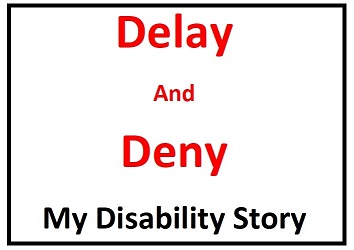Disability insurance company, Top ten reasons how an insurer takes advantage of you, Disability attorney mandatory, Delay and deny is their advantage
From Elkind & Shea Disability Benefits Law Firm.
“Top Ten Reasons How An Insurer Takes Advantage of You
1. The Insurer Issues the Coverage. The insurer hires these nefarious persons called “actuaries” who take all the medical and statistical evidence and analyze the data extensively. The actuaries know the rate of illness and concurrent disability for the population in general and as broken down into categories such as age, medical condition, occupation, etc. These people know the real score. So, when the insurer writes the policy for coverage, it has already assessed its projected profit margin in terms of premiums collected as reduced by projected claims to be paid. The insurer also realizes that it increases its guaranteed profit by denying merit worthy claims, thus creating windfall profit for itself and its stockholders.
2. The Insurer Writes the Disability Policy. Have you read the language in your disability coverage. I mean actually taken the policy out of storage (private policies will typically be stuck to the plastic protector sheets) or acquire it from your employer, opened it up, and read the policy language. Talk about dense, nonsensical language. After one minute you will want to scream that” “Only Lawyers Could Understand This Crap!” Your are right. The policy was written by teams of lawyers working for different insurers with the policy language replicated and rewritten time and again to make it increasing restrictive over the years in many subtle and underhanded ways. The insurer knows that you will not likely ever read the policy terms let alone understand them. The insurer only hopes that you will try to “go it alone” on your appeal so as to prevent your being able to win in court in the future (see full explanation in 6 below).
3. Your Employer Will Not Assist You in Keeping Your Job. Your employer has purchased the policy so it can acquire your work ability for its goals, but the employer will not held responsible should you become disabled and unable to perform your work. If the employer is faced with increasing numbers of workers being paid disability, then the premium for the company will escalate. The company’s purpose is to create profits and reduce liabilities. So, there is a disincentive to helping employees declare disability. The sad truth is that the employer is more likely to make efforts to undermine your disability claim. More often than not, employers refuse to incur any additional expense in assisting their impaired employees with necessary adaptive equipment, work load, or work schedule accommodations in order to assist these workers in maintaining their productivity. Usually, the employer will tender the most superficial assistance so as to save face in front of other employees as it quietly pressures the impaired worker into leaving work on a disability claim. After you make your claim, the employer will make sure to inform the disability insurer of all the “efforts” it made to help you and your unwillingness to work despite offered accommodations.
4. Your Employer Receives a “Double Benefit” by Undermining Your Disability Claim. Older members of the workforce are much better paid than newer, younger members entering the working world. Therefore, every older, more expensive worker replaced by a younger, cheaper worker results in a net gain for the employer regardless of experience lost. The corporate creed is to cut costs no matter what the consequences are to worker satisfaction. Where employers become very aggressive in undermining worker disability claims is by offering hurt or ill workers the opportunity to be “temporarily reassigned” to a part-time position. This means your being set up for failure. The employer is purposefully changing your “own occupation” under the insurance policy so that if you make a claim, you may only receive a portion of the part-time position you held prior to stopping work. This represents a huge discounting of your potential disability benefits and future financial security. Even worse, the burden of proving you are incapable of sustaining part-time work is that much harder, ultimately leading to a denial of your disability benefit claim. This way, the employer has eliminated a higher paying position and made sure to control its insurance premium cost, thus a “double benefit” by hurting its employee. Do not ever let this happen to you.
5. The Disability Insurer Does Little to Assist You with Your Disability Claim. When you make your disability claim, you will typically be greeted by an overburdened claims intake person who could care less about you or your claim. Their job is to process these claims and assign them to claim reviewers for the purpose of creating a basis for claim denial in as many cases as possible. When you call and ask for information concerning your claim, you will receive very general responses and absolutely no offer of advice for what should be provided to assist with the claims process. The insurer really does not want your input, rather they will prefer to work on documenting what they have to in order to deny your claim later. Do not be lulled into a false sense of security if you are paid short term disability. In most cases, short term disability is paid by the employer, not the insurer. When it is time for you to make a long term disability claim, you will find out how badly you can get treated.
6. The Disability Insurer Issues a Generic Claim Denial. Disability insurers play the infamous game of “hide the ball” with the language in their claim denials. Almost always, the blame will be placed on the claimant for not providing sufficient evidence of their disability to entitle them to benefits in accordance with the policy terms. At no time will you ever see an explanation of what exactly the insurer wants. Instead, you will read that there are a variety of items you may wish to send in to support your claims such as physician reports, medical tests, etc. This is done to lull you into believing you have just forgotten a few items and with supplementation can receive benefits by having your physician compose a report for you. You could not be more wrong……EVER. The insurer wants you to appeal your benefit denial without receiving assistance from a skilled legal counsel so you can be denied again. In most cases, the final denial will prevent an introduction of new supporting evidence in your case even if you decide to go to court afterwards. In essence, you have become your own lawyer and as the adage goes” A person who serves as his own lawyer has a fool for a client.” In this way, your own obstinance in failing to obtain legal help to assist in your administrative appeal of your claim denial can result in your never receiving disability benefits………just like the insurer wanted.
7. The Insurer Will Not Assist You in Preparing Your Appeal. As you will come to realize, the claim reviewer working on your claim is not your friend. They will try to persuade you to file your appeal on your own. Typically, they will try several approaches:
Use of mock surprise that a claim as well supported as yours could only be denied due to some “mistake” and that an appeal will probably result in an approval
Lay blame on you for not submitting enough documentation to support your claim and instruct you to go back to your doctor to get a letter to support your claim better
Deliberately antagonize you into writing “poison pen” letters which set forth every subjective reason why you feel disabled without actually gathering any evidence proving your case
These “Good Cop, Bad Cop” techniques are highly successful in goading claimants into filing unsupported appeals in order to create final denials which cannot be challenged in court.
8. The Insurer Wants to Use the Law Against You to Create a Final Denial Which Cannot be Challenged in Court. The insurer wants you to think that all you actually can respond and win your disability appeal. What most claimants fail to appreciate is that what their physician says is not binding on the determination of their case. The insurer has its own staff of doctors or recruits outside doctors to oppose your case. Since there is no presumption that the treating physician opinion is to be given more evidentiary weight, the insurer realizes that it can depend on its own physicians to deny the case and that denial, in more cases than not, will be sufficient to result in a complete denial of the claim even if it should be litigated afterwards. In addition, the insurer has its own vocational consultants who will offer opinions as to why you are able to perform your prior work or other work. Again, if these “experts” are not properly challenged, you will not be successful in receiving your benefits.
9. Your Insurance Commissioner Is Overwhelmed with Similar Complaints and Usually Will Not Assist You. In many cases, your state insurance commissioner will contact the insurer to see if there is a state jurisdiction under which the subject policy is bound. If it is a different state that the one in which you live, then your state insurance commissioner may state that it does not have jurisdiction over the claim and that you must contact another state insurance commissioner. Once you pursue the matter in the next jurisdiction, then you will receive a generic response letter from the other state commissioner stating that you have a legal remedy and they do not wish to get involved. This is similar to the letter you will receive from your own state commissioner in the unlikely event that your state insurance commissioner makes an inquiry into the handling of your case. In either event, you have wasted precious time in which you could have retained counsel and started preparations for filing of your appeal. This is what an insurer wants and all too many claimants are happy to hand this advantage to them.
10. The Insurer Wants You to “Grind Over” Your Claim Denial. The more time you take to call your employer, family, friends, insurance commissioner and the like will result in less time for you to begin preparation of a successful appeal. The insurer especially knows that by giving you insufficient answers to questions regarding your denial will lead you to lose your temper or composure and say things which could be documented in the file and held against you later. Also, the insurer welcomes very extended letters of appeal by claimants as the composition of these diatribes will only be utilized as evidence that the claimant is capable of performing work. Threats to “go to the media” or “bad mouth” the insurer publicly or on the internet are useless. These approaches have never worked for others and certainly will not work for you. “60 Minutes” and “Dateline” have covered this story already and your sad tale is not special. While you are wasting your time doing this, the insurer may be taking videotape surveillance of you or sending your records for additional medical or vocational review. No matter what, it will all be done behind your back unless you know who and what to ask for and how to make sure you protect your rights.
What Do I Do to Prevent Being Taken Advantage of by a Disability Insurer?”
Read more:
http://www.disabilitybenefitslawfirm.com/articles_TopTen.htm



